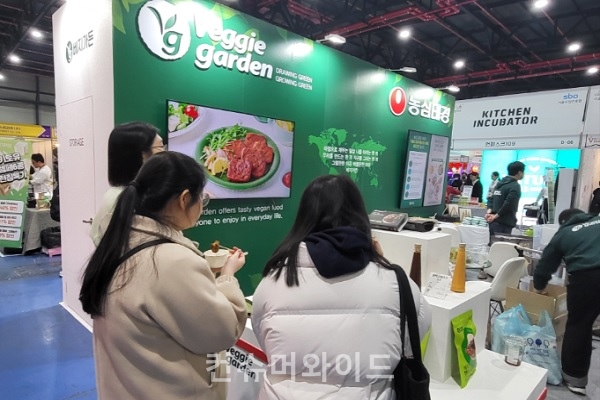As more customers are willing to consume products rooted in ethical, eco-friendly values, the vegan market is growing rapidly. However, the market is lacking a government-approval system for vegan products.

[Consumerwide_Jinil Kang Reporter / Yohan Bok Reporter] The vegan market is growing rapidly every year. As more customers are willing to consume products rooted in ethical, eco-friendly values, the vegan market is expanding. The vegan stands for one of pure vegetarians, including fruitarian, vegan, Lacto vegetarian, Ovo vegetarian, and Pesco vegetarian. From meat to eggs, dairy products, and honey are all excluded from their meal. However, veganism is stretching its territory from food life, which includes meat alternatives, vegetarian eggs and vegan bakeries, to clothes and cosmetics.
According to Kotra, the domestic vegan market has a scale of 17.4million dollars (24bn won) in 2020. Considering the global market being 26.1bn dollars (79 tn won) in the same year, the Korean vegan market is only at the beginning stage. Nevertheless, due to rising ethical and environmental issues in Korea, more customers are getting interested in the vegetarian way of consumption. For this reason, I predict continuous growth in the domestic vegan market. Referring to KB (Kookmin Bank) credit card, for the last 3 years vegan specialized food restaurant chains have rapidly increased, from 76% in 2020 to 391% in 2022. In the age category, the purchase record of customers in their 20th increased from 200% in 2019 to 821% in 2022. During the same period, the purchase record of customers on their 30th increased from 202% in 2019 to 424% in 2022.
However, the issue lies in having no regulations in Korea regarding vegan food manufacturing, sales, and advertising. Thus, unrealistic excessive advertising and inaccurate marks are everywhere driving consumers to confusion. For instance, Lotteria released a patty product which was promoted as 100% vegetarian petty in 2019. Later on, it was found that they have used mayonaise, milk, and beef, which are animal-derived ingredients for the burger. GS25 also promoted meat alternative meal kits, and advertised it contains vegan- certified ingredients. Afterwards, it was found out that some of the products included beef and milk ingredients. As a consequence, their products were criticised in the market. At long last, both companies re-released "pure vegan" products.
Another issue counts on not having a national accreditation center in the domestic area. Earlier, the ministry of food and drug safety registered the 'Korean certification registrars' for the vegan certifying task. However, their authorities closed by May, 2019. So, no longer a vegan related national accreditation system exists. This is probably the main reason that multiple private certifying companies are growing in Korea. They've been actively doing certifying businesses, yet, no one knows in what standard they give out certification as well whether they are applying standards of ofiicial certifying authority in Europe and the US. Thus, this can raise a confusion among consumers. In order to stop the chaos, it seems to be the government authorities, including the ministry of food and drug safety, have got to stand for the customer citizens by making national standards for vegan products as well as managing private certifying bodies.
- [Reporter's note] Cultural consumption and NunuTV, decisive action to turn away from the black market.
- [Reporter's note] The price of Sulwhasoo Yoonjo Essence, which costs an extra 10 thousand won, along with an aggressive sample product covering during the Month of appreciation
- [Reporter's note] 'Value-consumption through purchasing second-hand clothes'..Protecting my skin while providing work places for people with disabilities
- [Reporter's note] Commercial 'Door' refrigerators in the convenience store and supermarket are not an option, but compulsory...reducing electricity expenses and saving the earth by value-consumptio
- [Reporter's note] Can probiotics consumption for your children be a value-consumption?
- [Reporter's note] Volkswagen, the first electric car in the domestic market, is having the second Recall...They have got to improve in quality, safety, and customer satisfaction.
- [Reporter's note] Vehicle tax changes on July 1st. Is it a reform or confusion?
- [Reporter's note] Consumers won't confide in humanless convenience stores any more, if they are handled carelessly...Food with too much E.coli and distribution of expired food
- [Reporter's Note] Light speed VS turtle speed; Reflecting raw material cost at different speeds in the food market..." Irrational pricing matter"
- [Reporter's Note] Smokeless "Dipping tobacco", why not in the domestic market?... Some see a low tax policy for "dipping tobacco" as worthwhile.
- [Reporter's note] Aspartame might be out of the market eventually, just like Parabens... We've got to check them out thoroughly concerning our body.
- [Reporter's Note] Time to wear masks again... Covid-19 pandemic in summer
- [Reporter's note] CJ Oliveyoung, were they really abusing small businesses in their dominant position? Korea Fair Trade Commission has got to investigate thoroughly.
- [Reporter's note] A culture of rest and recovery is necessary in the delivery industry.
- [Reporter's note] Another victim of SNS scams, including Tiffany&Co. jewelry (85% sales)... How long has the consumer got to endure alone?
- [Reporter's Note] Chuseok delivery failure has been repeated every year... There has got to be a fundamental change.

